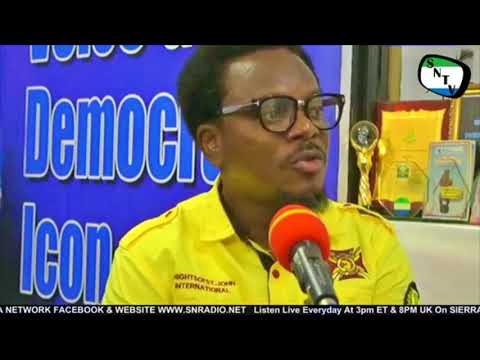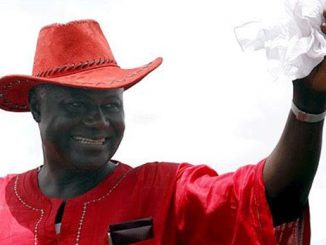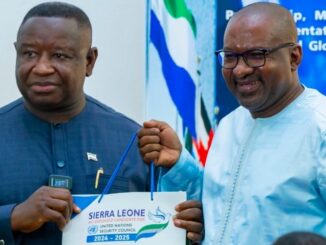
PONDER MY THOUGHTS
BY Andrew Keili
HONS. ”TAWA” AND NGEVAO: PARLIAMENT’S SACRIFICIAL LAMBS?
The ACC’s insistence on getting evidence from whistle blowers to prove corruption by Parliament reminds me of my Uncle Ngo B (Name withheld – May his soul rest in peace), who deprived me of my “Right to food” during my infancy. Let me explain. I was reputed to be a cry baby – I cried incessantly for my food when I was a baby even when fed “tons of food”.

Well, I learnt later in life from Ngo B (a favourite Uncle assigned to feed me my rice and plassas) on the reason. He used to eat half of the food and “paint” my mouth and entire face liberally with palm oil to prove how much the “glutton”, Karmoh enjoyed his food. With only half my allotted portion in my stomach, I certainly had to cry as I could not express myself otherwise. It was difficult to prove the offence-what has been eaten has been eaten! I will tell you later what this has to do with the ACC’s pursuit of the Parliamentary corruption issue, but back to serious business.
Two of SLPP’s bright lights in Parliament, Hon. Ibrahim Tawa Conteh and Ho. Hindolo Ngevao are facing the Speaker’s guillotine for being “unable” to prove their assertion that Parliament is corrupt. Their views were aired in local and international media, getting the Parliamentary leadership on the ropes. The ACC has been involved in investigating accusations from these two Parliamentarians, going back, initially to Hon. Tawa’s media tiff with the Clerk of Parliament, Paran Tarawally. It would seem the ACC has made no headway on the more recent issues, and is squarely putting the burden of proof on the accusers.
The Parliamentary leadership must have surely got hot under the collar with repeated corruption issues surrounding them-or perceptions of it. Unflattering reports by two respected Civil society organisations, CARL and IGR mention that Parliament is considered by an inordinately high proportion of the populace as being corrupt.
The Parliamentary leadership and their spokespersons have not taken too kindly to the accusations and it would appear their promise of having an introspective look at themselves to address the issue of swirling corruption accusations have been put in the back burner, whilst they turn on their own. Tawa and Ngevao have become the proverbial sacrificial lambs. Both gentlemen are being investigated with two other MPs, who it is claimed were irreverent to two female MPs. It is not known what fate will befall both gentlemen but they stand a chance of being severely punished, although for starters, they have been removed from Parliamentary oversight duties as they are being investigated by the Parliamentary Committee on Priviledges and Ethicsfor “unverified corruption allegations against Parliament on BBC Focus on Africa (by Hon. Hindolo Ngevao) and alleged arm-twisting by the leadership of Parliament resulting in resignation (of Hon. Tawa Conteh)”
Both men have not taken too kindly to this state of affairs and have started fighting back.
They seem to stand strongly by their assertions. In true “Governor Clarkson” style, Hon. Ngevao, a lawyer of no mean repute has abandoned the pursuit of this issue legally and invoked divine intervention. He is quoted as saying:
“If by speaking the truth that there’s corruption in Parliament this nation will sit by and see people punish me, I sit and await God to fight for me. I don’t rely on man, but God. The God that created me, the God who said one should not lie, a God who made me take that oath in Parliament and for which I decided to be honest, that God will definitely fight this battle for me……I am not a Bishop. I am not a reverend. I am not a Pastor. But mark my words. If this nation called Sierra Leone; the nation that is seeing everything that is happening in Parliament that I spoke of fail to come to my aid and stand in my defense and allow me to be punished for speaking the truth, agony shall befall the nation I call Sierra Leone.”
Hon. Tawa in typical “Tawa style” is ready to fight all the way. He says:
“However, it shows Parliament which is the law-making body can institute an action before investigating and doesn’t believe in people that have the ability to challenge the status quo and are ready to do things right.”
Many people are critical of what they consider is the ACC’s “ivory tower attitude” on this issue- wanting to wait till both gentlemen unequivocally prove corruption. I am sure the ACC would say such an accusation is unfair. I should also state that there are some that have said both gentlemen, especially Hon. Ngevao, a legal person should have known better than state something that he is unable or unwilling to prove for whatever reason. Well, this may be true, but we will discuss the difficulties later.
The gentlemen have not been left in the lurch. Thankfully, to save us all from the wrath in Hon. Ngevao’s “eternal damnation prayer” a consortium of civil society organisations (nearly all the top ones are involved) has rushed to the defence of both gentlemen. The general consensus from this and other critical voices is that they should instead be thanked for blowing the whistle on Parliamentary corruption.
The fact remains that it is difficult to prove malfeasance by Parliamentarians. A careful examination of all the potential areas in which corrupt practices may be carried out indicates the possibility is great even if the evidence is not concrete. The following circumstantial issues may give the impression that Parliament may be shirking on its responsibilities by “sins of commission or omission”.
1. Why do hearings of the Parliamentary Appointments committee always seem to be rushed? How much vetting is done of appointees? Have we not seen many instances of Parliament giving rave reviews of an individual only to find him/her mess up months later? Who puts on the pressure for quick approvals? – the individuals? , the Executive wing of government? How does this happen?
2. Have Parliamentary committees not often complained about lack of funds to carry out oversight duties? Is the Parliamentary leadership not aware, as are many people about complaints from some companies who would like to remain anonymous about requests for “favours”?
3. What is the length of time taken to approve major pieces of legislation? Does Parliament discuss these exhaustively?
4. How were the issues concerning SALCAB and China Kingho, for which Hon. Tawa got infamous finally resolved?
5. Would it really be in the best interest of individuals going for appointments or companies asked for “favours” to make official reports of Parliamentary malfeasance even if these occurred?
To be fair, these corruption issues are not easy for ACC to prove. Many people can easily buy access to elected officials even in advanced countries. A conviction requires proof that the official committed an act that goes to the core of their office. The process of investigating and prosecuting corruption in the legislature is confusing and complicated – at best. At worst, it is specifically designed to shield lawmakers from legal scrutiny and consequences for unethical behavior.
Notwithstanding the difficulties, ACC can still do something about this issue especially when you have repeated accusations. This can be done in several ways. There is nothing for example stopping ACC from instigating the occasional “sting operation”. ACC may also want to approach things from a systems review point of view by examining how Parliament functions and finding out ways of reducing opportunities for graft. This may however initially need the acquiescence of the leadership of Parliament. It does not help that they seem to be in self-denial.
The fact that Parliament polices itself is worrisome. Legislative corruption is difficult to unearth when lawmakers’ have power to police their own ethics violations.
The difficulty of proving Parliamentary corruption brings me back to my famed Uncle, Ngo B. How did it end? Well, my mum finally became the ACC and set up some Aunties to spy on Ngo B, and he was caught in the act. The reason for the sting operation? -Well, my mum reckoned it was strange that I did not cry when someone else fed me-elementary, my dear Watson!
No doubt ACC can learn from this. But coming back to Parliament, we can only appeal to the leadership to not make sacrificial lambs of Messrs Tawa and Ngevao, who I am certain mean well for this country.
Ponder Ngo B. Ponder my thoughts.



